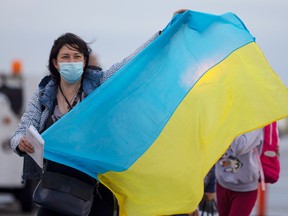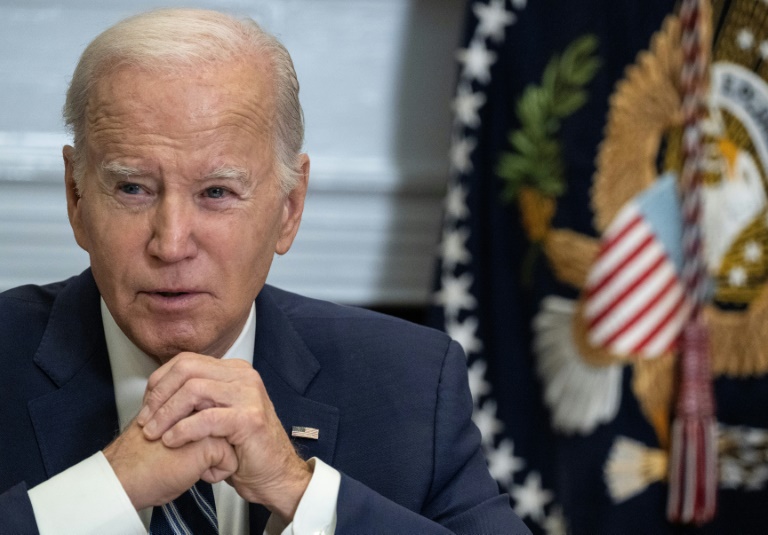‘It risks setting a significant precedent, one which may result in future pressures on the government to take similar action for other emergencies’
Article content
OTTAWA – Federal bureaucrats warned the Trudeau government about a program that loosened immigration procedures to allow in more Ukrainians fleeing the war, cautioning it was setting a “significant precedent” by setting aside typical rules.
The Liberals brought in the Canada-Ukraine authorization for emergency travel (CUAET) program shortly after Russia’s invasion of Ukraine in 2022. It allowed Ukrainians to come here on a three-year basis and receive work and study permits while in Canada. Almost 300,000 people have come to Canada under the program, while almost one million people successfully applied for visas.
Advertisement 2
Article content
The program removed standard requirements in temporary immigration programs, including medical exams before travelling, and requirements that Ukrainians commit to leaving Canada at the end of their visas.
Government briefing notes released under a legal challenge warned then Immigration Minister Sean Fraser the government was going much further than it typically does.
“The design of the CUAET is exceptional in nature. It underscores Canada’s unique relationship with Ukraine, the extensive diaspora and family links, as well as the unique nature of the conflict as a significant land invasion adjacent to EU countries with generous immigration measures,” reads one briefing note. “However, it risks setting a significant precedent, one which may result in future pressures on the government to take similar action for other emergencies.”
The memo cited possible emergencies in Lebanon and Ethiopia as future countries where there would be pressure on Canada.
Bureaucrats also warned the minister that the CUAET program risked tasking an already overburned temporary resident program.
Article content
Advertisement 3
Article content
“IRCC, the CBSA, and the Immigration and Refugee Board have noted as part of the Budget 2022 process, and the Afghanistan initiative, that funding for the asylum system is already insufficient, and its sustainability is at risk.”
Yavar Hameed, an Ottawa-based human rights lawyer, filed the legal challenge on behalf of several Afghan Canadians who had family members that have not been allowed to come to Canada.

He doesn’t oppose the program Canada set up for Ukrainians, but argues it’s a much more generous program than the one established for Afghans fleeing the Taliban takeover of Afghanistan. In a decision just published, Federal Court of Appeal Justice Alan Diner ruled against the government, which was seeking to avoid having to disclose the documents.
The briefing note mentions details about why the government invoked the policy should not be published in this case, because it went so far beyond the norm.
“Given the unprecedented and exceptional nature of this approach to the temporary resident program, it is recommended that this public policy not be published,” reads another briefing note.
Advertisement 4
Article content
Hameed said the fact the government suggested not publishing the policy makes it clear they knew they were setting up a discriminatory policy.
“The advice was not to publish this, not to disclose the memo and why? The reason why is because of the exceptional nature of CUAET,” he said.
The Ukrainian program allowed any Ukrainian to come to Canada, while the Afghan program had limitations. Interpreters who worked with Canada could come to the country, but they were limited to their immediate family.
Hameed said that limitation on the program has had dire consequences for his clients.
“Their direct family and extended family have been killed already, and so we know that we’re not speculating about what the threat is like. It’s a real threat.”
He said he hopes the government will allow family members of his clients to come to Canada, but also consider changing the entire policy towards Afghans.
Isabelle Dubois, a spokesperson for the Immigration department, said the court ruling doesn’t change the overall challenge and was only about what documents the government had to provide
Advertisement 5
Article content
She said Canada’s immigration programs are not one-size fits all and the situations in Afghanistan and Ukraine are different.
“Canada tailors each response to meet the unique needs of those who require our support. The situations in Afghanistan and Ukraine were very different and required different responses,” she said in an email.
“Afghans were fleeing those in power in their own country and required a permanent protection solution, and are being resettled to Canada on a permanent basis. Ukrainians were not fleeing their own government, and it is expected that an end to hostilities would allow them to return home.”
She said the government fully intends to keep defendings itself in the case.
National Post
rtumilty@postmedia.com
Get more deep-dive National Post political coverage and analysis in your inbox with the Political Hack newsletter, where Ottawa bureau chief Stuart Thomson and political analyst Tasha Kheiriddin get at what’s really going on behind the scenes on Parliament Hill every Wednesday and Friday, exclusively for subscribers. Sign up here.
Recommended from Editorial
Our website is the place for the latest breaking news, exclusive scoops, longreads and provocative commentary. Please bookmark nationalpost.com and sign up for our politics newsletter, First Reading, here.
Article content








